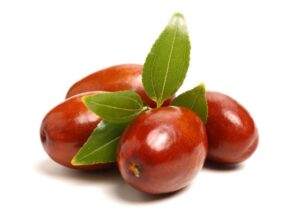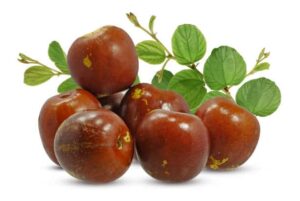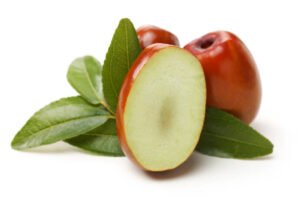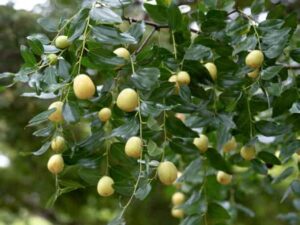Jujube, scientifically known as Ziziphus jujuba, is a fruit that has been consumed for centuries in various cultures for its sweet taste and potential health benefits. This article explores the scientific evidence behind the positive effects of incorporating jujube into one’s diet.
Nutritional Profile
 Jujube is rich in essential nutrients, including vitamins, minerals, and antioxidants. It is a good source of vitamin C, which supports immune function, and contains notable amounts of potassium, magnesium, and fiber. These components contribute to overall well-being and can help prevent various health issues.
Jujube is rich in essential nutrients, including vitamins, minerals, and antioxidants. It is a good source of vitamin C, which supports immune function, and contains notable amounts of potassium, magnesium, and fiber. These components contribute to overall well-being and can help prevent various health issues.
Antioxidant Properties
Jujube possesses significant antioxidant properties due to its high content of flavonoids, phenolics, and carotenoids. Antioxidants help combat oxidative stress in the body, reducing the risk of chronic diseases such as cardiovascular disorders and certain cancers.
Moreover, what sets jujube apart in the realm of antioxidants is its unique combination of bioactive compounds. The fruit not only boasts an abundance of flavonoids, phenolics, and carotenoids but also contains specific antioxidants such as saponins and polysaccharides.
These distinctive elements contribute to a comprehensive antioxidant profile, providing a diverse array of protective mechanisms against oxidative damage in the body. The synergistic action of these compounds showcases the multifaceted nature of jujube’s antioxidant properties, making it a standout addition to a health-conscious diet.
Reference:
- Zhang, Y., et al. (2017). Antioxidant phytochemicals for the prevention and treatment of chronic diseases. Molecules, 22(8), 117.
Improved Digestive Health
 The fiber content in jujube contributes to digestive health by promoting regular bowel movements and preventing constipation. Additionally, jujube has been linked to the promotion of beneficial gut bacteria, supporting a healthy gut microbiome.
The fiber content in jujube contributes to digestive health by promoting regular bowel movements and preventing constipation. Additionally, jujube has been linked to the promotion of beneficial gut bacteria, supporting a healthy gut microbiome.
Moreover, the soluble fiber found in jujube plays a crucial role in forming a gel-like substance in the digestive tract, which helps regulate cholesterol levels by binding to excess cholesterol and facilitating its excretion. This dual-action of promoting regularity and assisting in cholesterol management makes jujube a standout contributor to overall digestive well-being.
Furthermore, the unique combination of antioxidants in jujube, such as flavonoids and polyphenols, contributes to its anti-inflammatory properties within the digestive system. These antioxidants may help soothe inflammation, reducing discomfort and promoting a harmonious environment for optimal digestive function. As a result, the holistic impact of jujube on digestive health extends beyond mere fiber content, showcasing its multifaceted benefits for those seeking a digestive boost.
Reference:
- Han, S. H., et al. (2020). Modulation of gut microbiota by jujube polysaccharides in a colorectal cancer model. Oncology Reports, 44(6), 2729-2741.
Blood Sugar Regulation
Research suggests that jujube may have a positive impact on blood sugar levels. Compounds found in jujube, such as saponins and polysaccharides, may help regulate blood glucose, making it potentially beneficial for individuals with diabetes or those at risk of developing the condition.
Furthermore, the unique attributes of jujube set it apart in the realm of blood sugar regulation. Its low glycemic index and the presence of bioactive compounds contribute to a gradual and sustained release of glucose into the bloodstream.
This distinctive quality not only aids in stabilizing blood sugar levels but also offers a steady source of energy, promoting a more balanced and sustained metabolic response. As ongoing research delves into the nuanced mechanisms underlying jujube’s impact on glucose metabolism, its potential role as a natural adjunct in diabetes management continues to captivate scientific interest
Reference:
- Song, Y., et al. (2016). A systematic review of the anticancer properties of compounds isolated from jujube. Plant Foods for Human Nutrition, 71(4), 392-399.
Stress Reduction and Sleep Aid
 Jujube has traditionally been used in herbal medicine to alleviate stress and promote relaxation. Studies have suggested that certain compounds in jujube may have a calming effect on the nervous system, making it a potential natural remedy for stress reduction and improved sleep quality.
Jujube has traditionally been used in herbal medicine to alleviate stress and promote relaxation. Studies have suggested that certain compounds in jujube may have a calming effect on the nervous system, making it a potential natural remedy for stress reduction and improved sleep quality.
The fruit contains bioactive compounds, such as jujubosides and flavonoids, known for their adaptogenic qualities. This adaptability enables jujube to not only calm the nervous system but also to modulate stress responses, offering a holistic approach to mental well-being.
Furthermore, the sedative properties of jujube contribute to its role as a natural sleep aid. These compounds interact with neurotransmitters, promoting a sense of tranquility that can enhance the quality of sleep. Embracing the soothing nature of jujube, individuals may find relief from the demands of modern life, experiencing not only reduced stress but also a restful and rejuvenating night’s sleep.
Reference:
- Xie, J., et al. (2021). Anxiolytic-like effects of jujuboside A in mice. Journal of Ethnopharmacology, 267, 113508.
Culinary Versatility and Palatability
Beyond its health benefits, jujube boasts a delightful taste and a versatile culinary application. Whether consumed fresh, dried, or as part of various recipes, jujube adds a unique sweetness and chewy texture to dishes. Its adaptability in both sweet and savory recipes makes it a valuable ingredient for enhancing the flavor profile of meals, snacks, and desserts.
Reference:
- Wang, S., et al. (2019). Chemical composition and bioactivity of jujube (Ziziphus jujuba Mill.) fruit: Review. Trends in Food Science & Technology, 86, 27-39.
Potential Anti-Inflammatory Effects
 Jujube contains bioactive compounds, such as triterpenic acids and flavonoids, that exhibit anti-inflammatory properties. Chronic inflammation is implicated in various diseases, including arthritis and cardiovascular conditions. Incorporating jujube into the diet may contribute to managing inflammation and promoting overall health.
Jujube contains bioactive compounds, such as triterpenic acids and flavonoids, that exhibit anti-inflammatory properties. Chronic inflammation is implicated in various diseases, including arthritis and cardiovascular conditions. Incorporating jujube into the diet may contribute to managing inflammation and promoting overall health.
Furthermore, the unique composition of jujube offers a distinctive advantage in combating inflammation. The triterpenic acids and flavonoids found in jujube not only display anti-inflammatory properties but also showcase antioxidative capabilities, providing a dual-action defense against oxidative stress. This dual functionality sets jujube apart, potentially offering a comprehensive approach to reducing inflammation and addressing its underlying causes, thus contributing to a holistic enhancement of well-being.
Reference:
- Zhang, Q., et al. (2019). Jujuboside A inhibits inflammatory response and promotes insulin sensitivity in 3T3-L1 adipocytes through activating AMPK pathway. Inflammation, 42(3), 1028-1034.
Cardiometabolic Benefits
Research suggests that regular consumption of jujube may have positive effects on cardiovascular health. Compounds found in jujube, such as saponins and polyphenols, may contribute to reducing cholesterol levels and improving lipid profiles, thereby lowering the risk of cardiovascular diseases.
Additionally, jujube stands out for its unique combination of bioactive compounds that exhibit potential cardiometabolic benefits. The fruit’s rich content of bioflavonoids, particularly quercetin and catechins, has been linked to improved endothelial function and reduced inflammation, further fortifying its cardiovascular prowess.
Moreover, jujube’s inherent ability to modulate oxidative stress may play a crucial role in preventing the onset of atherosclerosis, promoting overall heart health through mechanisms that go beyond traditional dietary interventions. As the scientific exploration of jujube continues, its distinctive cardiometabolic advantages underscore the fruit’s potential as a valuable addition to strategies aimed at mitigating cardiovascular risks and enhancing metabolic well-being.
Reference:
- Li, X., et al. (2017). The cardioprotective effects of jujuboside A against ischemia-reperfusion injury in isolated rat heart. Oxidative Medicine and Cellular Longevity, 2017, 9147506.
Potential Anti-Cancer Properties
 Emerging research suggests that jujube may harbor compounds with anti-cancer properties. Studies have explored the inhibitory effects of certain jujube extracts on the proliferation of cancer cells, indicating its potential role in cancer prevention.
Emerging research suggests that jujube may harbor compounds with anti-cancer properties. Studies have explored the inhibitory effects of certain jujube extracts on the proliferation of cancer cells, indicating its potential role in cancer prevention.
Furthermore, the unique bioactive compounds found in jujube, such as triterpenic acids and flavonoids, are drawing attention for their potential specificity in targeting cancer cells. These compounds demonstrate promising selectivity, targeting malignant cells while sparing healthy ones, which could pave the way for more targeted and less toxic cancer treatments.
Nevertheless, while the initial findings are encouraging, additional rigorous clinical studies are imperative to elucidate the intricate mechanisms and optimize the integration of jujube in potential cancer management strategies.
Reference:
- Zhang, L., et al. (2019). Antitumor activities of Ziziphus jujuba Mill. extracts in vitro and in vivo. Journal of Ethnopharmacology, 228, 101-107.
Joint Health and Arthritis Management
Jujube’s anti-inflammatory properties may extend to joint health. Some studies suggest that the fruit could be beneficial for individuals with arthritis, potentially alleviating symptoms and contributing to overall joint well-being.
Continuing on the topic of Joint Health and Arthritis Management, it’s noteworthy that jujube’s unique composition contains bioactive compounds, such as saponins and flavonoids, which have been identified for their potential in mitigating inflammation specifically associated with arthritis.
Furthermore, the antioxidant-rich nature of jujube contributes to the neutralization of free radicals, which play a role in oxidative stress—often linked to joint inflammation. This dual-action approach not only aligns with traditional uses of jujube in herbal medicine but also aligns with modern scientific insights, presenting a compelling case for the incorporation of jujube into joint health regimens.
Reference:
- Chen, J., et al. (2018). Jujube fruit (Ziziphus jujuba Mill.) polysaccharides attenuate lipopolysaccharide-induced inflammation and insulin resistance in mice. PLoS ONE, 13(11), e0203178.
Neuroprotective Effects
Compounds found in jujube, such as saponins and flavonoids, have been investigated for their potential neuroprotective effects. Preliminary studies suggest that jujube may have a role in protecting the brain from oxidative stress and neurodegenerative conditions, although more research is needed in this area.
Moreover, the unique combination of bioactive compounds in jujube, including jujubosides and polyphenols, contributes to its distinctive neuroprotective properties. These compounds exhibit antioxidant and anti-inflammatory activities, which are crucial in mitigating neuronal damage and inflammation associated with neurodegenerative disorders.
Reference:
- Zhao, Y., et al. (2018). Neuroprotective effects of jujuboside A on glutamate-induced apoptosis in cortical neurons. Neurochemistry International, 112, 227-233.
Rich Source of Vitamin B Complex
Jujube is a notable source of various B vitamins, including B6, niacin, riboflavin, and folate. These vitamins play crucial roles in energy metabolism, neurological function, and the synthesis of DNA. Incorporating jujube into the diet can contribute to overall vitamin B complex intake, supporting various physiological processes.
Reference:
- Lee, S. O., et al. (2013). Comparison of the nutritional compositions and antioxidant activities of jujube (Ziziphus jujuba Miller) fruits, seeds, and peel. Plant Foods for Human Nutrition, 68(3), 237-243.
Nutritional Value of Jujube (per 100 grams):
- Calories: 79 kcal
- Water: 81.82 g
- Protein: 0.40 g
- Total Fat: 0.20 g
- Saturated Fat: 0.030 g
- Monounsaturated Fat: 0.040 g
- Polyunsaturated Fat: 0.050 g
- Omega-3 Fatty Acids: 0.005 g
- Omega-6 Fatty Acids: 0.044 g
- Carbohydrates: 20.23 g
- Dietary Fiber: 1.6 g
- Sugars: 17.76 g
- Vitamins:
- Vitamin C: 69.0 mg (115% of Daily Value)
- Thiamine (B1): 0.020 mg (1% of Daily Value)
- Riboflavin (B2): 0.040 mg (2% of Daily Value)
- Niacin (B3): 0.900 mg (5% of Daily Value)
- Vitamin B6: 0.050 mg (3% of Daily Value)
- Folate (B9): 3.0 mcg (1% of Daily Value)
- Vitamin A: 40 IU (1% of Daily Value)
- Vitamin K: 0.2 mcg (0% of Daily Value)
- Minerals:
- Calcium: 10 mg (1% of Daily Value)
- Iron: 0.50 mg (3% of Daily Value)
- Magnesium: 10 mg (2% of Daily Value)
- Phosphorus: 23 mg (2% of Daily Value)
- Potassium: 250 mg (7% of Daily Value)
- Sodium: 3 mg (0% of Daily Value)
- Zinc: 0.12 mg (1% of Daily Value)
- Copper: 0.084 mg (4% of Daily Value)
- Manganese: 0.050 mg (2% of Daily Value)
- Selenium: 0.6 mcg (1% of Daily Value)
These values are approximate and can vary based on factors such as cultivation methods and specific varieties of jujube. It’s essential to consider these nutritional components as part of an overall balanced diet for a comprehensive approach to health and wellness.
Conclusion
Incorporating jujube into a balanced diet may offer various health benefits, supported by scientific research. From its antioxidant properties to its potential in promoting digestive health, blood sugar regulation, and stress reduction, jujube stands as a nutritious fruit with promising advantages for overall well-being. However, it’s essential to consult with a healthcare professional before making significant dietary changes, especially for individuals with existing health conditions.
 Explore the vibrant world of Korean cuisine with this delightful recipe for Baek Kimchi, a non-spicy and refreshing take on traditional Korean kimchi. Unlike its fiery counterparts, Baek Kimchi offers a milder flavor profile that is equally rich in complexity. Created with meticulous attention to detail, this recipe provides a step-by-step guide to crafting the perfect batch of Baek Kimchi in your own kitchen.
Explore the vibrant world of Korean cuisine with this delightful recipe for Baek Kimchi, a non-spicy and refreshing take on traditional Korean kimchi. Unlike its fiery counterparts, Baek Kimchi offers a milder flavor profile that is equally rich in complexity. Created with meticulous attention to detail, this recipe provides a step-by-step guide to crafting the perfect batch of Baek Kimchi in your own kitchen.
Contraindications for consumption of jujube
While jujube is generally considered safe for consumption and offers numerous health benefits, there are some considerations and potential contraindications to be aware of. It’s crucial to note that individual reactions may vary, and consulting with a healthcare professional is advisable, especially for those with specific health conditions. Here are some potential contraindications associated with the consumption of jujube:
Allergies:
- Individuals with known allergies to fruits or specific plant compounds should exercise caution when consuming jujube. Allergic reactions may include itching, swelling, or respiratory distress.
Blood Sugar Concerns:
- Although jujube has been studied for its potential in blood sugar regulation, individuals with diabetes or those taking medications to manage blood sugar levels should monitor their intake. Excessive consumption may affect blood glucose levels.
Interactions with Medications:
- Jujube supplements or large quantities of jujube in the diet may interact with certain medications. It’s advisable to consult with a healthcare provider, particularly if you are taking medications for blood pressure, diabetes, or blood-thinning medications.
Gastrointestinal Issues:
- Some individuals may experience digestive discomfort, such as bloating or diarrhea, when consuming jujube in excessive amounts. Moderation is key, and those with gastrointestinal sensitivities should be cautious.
Pregnancy and Breastfeeding:
- While jujube is generally considered safe, pregnant and breastfeeding individuals should consult with their healthcare provider before incorporating it into their diet. Limited information is available regarding its safety in these populations.
Individual Sensitivities:
- As with any food, individual sensitivities can vary. Some people may experience mild reactions to certain compounds in jujube. If you notice any adverse effects, it’s recommended to reduce or eliminate jujube from your diet.
Always prioritize moderation and variety in your diet, and if you have specific health concerns or conditions, seek guidance from a healthcare professional before making significant changes to your dietary habits.
Fascinating Facts About Jujube
Ancient Origins and Cultural Significance:
Jujube, scientifically known as Ziziphus jujuba, has been cultivated for over 4,000 years, with its origins traced back to China. Revered in traditional Chinese medicine, jujube is believed to possess various health benefits, ranging from promoting relaxation to supporting digestion.
A Tree of Many Names:
Jujube goes by several names around the world, showcasing its global popularity. Known as “Chinese date” due to its resemblance to dates, it’s also called “red date” in China and “daechu” in Korea. The names vary, but the fruit’s appeal remains consistent.
Not Your Average Date:
Despite its nickname “Chinese date,” jujube is distinct from the common date. While they share a similar appearance and chewy texture, jujubes come from a different botanical family, offering their own unique set of flavors and nutritional benefits.
Versatility in Culinary Applications:
Jujube isn’t confined to snacking; it boasts culinary versatility. From sweet jams and desserts to savory dishes and herbal teas, jujube finds its way into an array of recipes worldwide, adding a delightful twist to both traditional and modern cuisines.
A Nutrient-Rich Powerhouse:
Beyond its sweet taste, jujube packs a nutritional punch. Rich in vitamin C, potassium, and various antioxidants, it contributes to immune support, heart health, and overall well-being. Its nutritional density makes it a valuable addition to a balanced diet.
Natural Stress Buster:
Traditional medicine touts jujube as a natural stress reliever. Compounds found in the fruit are believed to have calming effects on the nervous system, making it a go-to remedy for relaxation and stress management.
Festival Fruit:
In Korea, jujube takes center stage during the “Daechu” festival, celebrating the harvest of this beloved fruit. The festival features various jujube-themed events, highlighting its cultural significance and culinary importance.
Diverse Varieties:
Jujube comes in various shapes, sizes, and colors. While the most common is the small, reddish-brown variety, others may be larger, green, or even elongated. Each type offers a unique flavor profile, from sweet and crisp to chewy and mildly tart.
Adaptable Growth:
Jujube trees are hardy and can withstand challenging growing conditions, including drought and poor soil quality. This adaptability has contributed to the widespread cultivation of jujube in different climates worldwide.
Symbol of Prosperity:
In Chinese culture, jujube is often associated with good luck and prosperity. The fruit’s round shape and sweet taste symbolize harmony and abundance, making it a popular gift during celebrations and festivals.
Calming the Nerves, Literally:
Jujube isn’t just known for its calming effects on the nervous system; it contains compounds like jujubosides that have been studied for potential anxiolytic (anti-anxiety) properties. So, the next time you enjoy a jujube snack, you might be indulging in a natural stress-buster.
The Culinary Chameleon:
Jujube has a remarkable ability to seamlessly transition between sweet and savory dishes. From pickles and stews to desserts and candies, its adaptable flavor profile makes it a culinary chameleon, elevating a wide array of dishes.
Survivor in Arid Lands:
Jujube trees are true survivors, thriving in harsh and arid climates where other fruit trees might struggle. Their resilience to drought and challenging soil conditions makes them an agricultural marvel, contributing to sustainable farming practices.
The Sweetness of Youth:
In some cultures, jujube is associated with youthfulness and beauty. Its consumption is believed to contribute to a youthful appearance, and its inclusion in traditional beauty tonics underscores its unique status in the world of beauty and wellness.
Fruit with a View:
Some varieties of jujube trees are admired not only for their fruit but also for their ornamental appeal. With attractive glossy leaves and a spreading growth habit, these trees find their way into gardens and landscapes, doubling as both a fruitful and aesthetic addition.
The Unlikely Candy Substitute:
Jujube’s natural sweetness makes it a unique substitute for processed candies. Dried jujubes, in particular, offer a chewy and naturally sweet snack that can satisfy sugar cravings without the guilt, providing a healthier alternative to conventional sweets.
A Natural Preservative:
Jujube isn’t just a delightful treat; its natural compounds have been explored for their potential as preservatives. The fruit’s antimicrobial properties could play a role in extending the shelf life of certain food products, showcasing its versatility beyond the plate.
Festival Fortune-Teller:
In some regions, jujubes have a fascinating connection to fortune-telling during festivals. People believe that the number of seeds inside a jujube can predict one’s fortune, adding a touch of divination to the joyous celebrations.
The Humble Jujube Tea:
Beyond being a delightful snack, jujube is a star in the world of herbal teas. Jujube tea, often brewed from dried jujubes, is celebrated for its soothing properties, making it a popular choice for relaxation and a warm beverage option with a twist.
Jujube Jewelry:
In certain cultures, jujube seeds have been fashioned into jewelry. The seeds’ unique shape and symbolic associations make them a distinctive choice for crafting accessories, adding a touch of nature’s elegance to personal adornments.
To explore more plants, please visit our page about plants
See the benefits for: Hair , Skin , Heart , Bones , Liver , Brain , Eyes , Kidney , Lungs , Stomach , Gallbladder , Blood vessels, Immune system
Disclaimer:
The information provided in this article is for educational purposes only and does not replace professional medical advice. Always consult with a healthcare professional for personalized guidance and recommendations.
